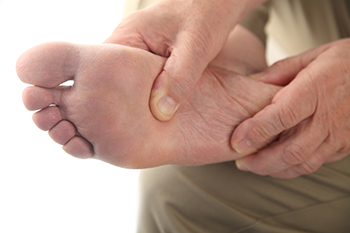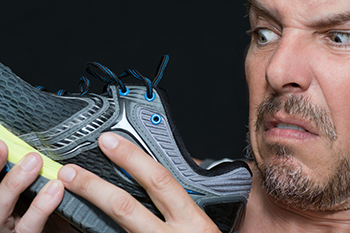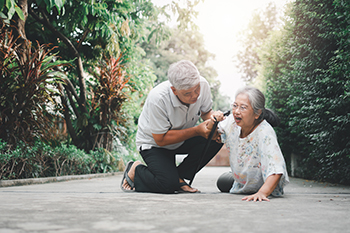Items filtered by date: June 2023
What Is a Good Diabetic Foot Care Routine?

Routine foot care is important for everyone and it's especially important for diabetic patients. If an individual has diabetes, there can be accompanying nerve damage and circulation problems that can cause difficulty in feeling pain and inhibit healing. For these people who have foot problems that are left untreated, an infection may develop. It is critical for people who have diabetes to monitor their blood sugar levels daily, in addition to exercising regularly and eating healthy foods. Following a good diabetic foot care regimen is also suggested. This includes inspecting the feet for sores, redness, cuts, and blisters. It is beneficial that the feet are washed, dried, and moisturized each day, and toenails are properly trimmed weekly. Those with diabetes should not walk barefoot and it is suggested that protective and enclosed footwear are worn. If you have diabetes, it is strongly suggested that you include a podiatrist among your healthcare professionals who can examine your feet and help you to manage this condition.
Diabetic foot care is important in preventing foot ailments such as ulcers. If you are suffering from diabetes or have any other concerns about your feet, contact Gary J. Kaiserman, DPM from Achilles Footcare Center. Our doctor can provide the care you need to keep you pain-free and on your feet.
Diabetic Foot Care
Diabetes affects millions of people every year. The condition can damage blood vessels in many parts of the body, especially the feet. Because of this, taking care of your feet is essential if you have diabetes, and having a podiatrist help monitor your foot health is highly recommended.
The Importance of Caring for Your Feet
- Routinely inspect your feet for bruises or sores.
- Wear socks that fit your feet comfortably.
- Wear comfortable shoes that provide adequate support.
Patients with diabetes should have their doctor monitor their blood levels, as blood sugar levels play such a huge role in diabetic care. Monitoring these levels on a regular basis is highly advised.
It is always best to inform your healthcare professional of any concerns you may have regarding your feet, especially for diabetic patients. Early treatment and routine foot examinations are keys to maintaining proper health, especially because severe complications can arise if proper treatment is not applied.
If you have any questions please feel free to contact our offices located in Forest Lane and West Kiest Boulevard Dallas, TX . We offer the newest diagnostic and treatment technologies for all your foot and ankle needs.
Why Your Feet Sweat and Smell Bad

If you notice that your feet smell bad, it is likely caused by having sweaty feet. When the skin stays damp it invites bacteria, which thrive in moist, warm environments. When the bacteria grow, they break down the sweat and produce chemicals with a foul odor. The main cause of the odor is sweating in your socks and shoes and not allowing your feet to dry out. Common causes of sweaty feet include standing on the feet for long periods of time, wearing tight shoes that do not breathe, and wearing shoes that have not completely dried out. Other causes can include not changing your socks or washing your feet daily, certain hormonal changes, and a condition called hyperhidrosis. This condition causes the sweat glands to overproduce moisture. If you have both sweaty and malodorous feet, it is suggested that you seek the help of a podiatrist who is trained to deal with such ailments.
If you are suffering from hyperhidrosis contact Gary J. Kaiserman, DPM of Achilles Footcare Center. Our doctor can provide the care you need to attend to all of your foot and ankle needs.
Hyperhidrosis of the Feet
Hyperhidrosis is a rare disorder that can cause people to have excessive sweating of their feet. This can usually occur all on its own without rigorous activity involved. People who suffer from hyperhidrosis may also experience sweaty palms.
Although it is said that sweating is a healthy process meant to cool down the body temperature and to maintain a proper internal temperature, hyperhidrosis may prove to be a huge hindrance on a person’s everyday life.
Plantar hyperhidrosis is considered to be the main form of hyperhidrosis. Secondary hyperhidrosis can refer to sweating that occurs in areas other than the feet or hands and armpits. Often this may be a sign of it being related to another medical condition such as menopause, hyperthyroidism and even Parkinson’s disease.
In order to alleviate this condition, it is important to see your doctor so that they may prescribe the necessary medications so that you can begin to live a normal life again. If this is left untreated, it is said that it will persist throughout an individual’s life.
A last resort approach would be surgery, but it is best to speak with your doctor to find out what may be the best treatment for you.
If you have any questions please feel free to contact our offices located in Forest Lane and West Kiest Boulevard Dallas, TX . We offer the newest diagnostic and treatment technologies for all your foot and ankle needs.
Do You Suffer From Painful Feet?
An Unsteady Gait Can Indicate Health Issues

We learn to walk at an early age, putting one foot in front of the other to get somewhere else. Unless you are on a trail or other uneven surface, most people have a smooth and even gait. When this normal pattern changes and the walking is less steady, it may be a sign of a problem termed ataxic gait. Symptoms include dizziness or vertigo, shuffling, loss of balance, and stumbling. Among the causes of an unsteady gait are cardiovascular disease, musculoskeletal or neurological disorders, infections, or certain medications. Someone with an unsteady gait may exhibit changes, such as standing or walking with the feet wider apart, walking more slowly, or falling more often. If you notice such changes in behavior around walking, it is suggested that you make an appointment with a podiatrist for a gait evaluation. You may be asked to walk toe to heel, and your stance, step length, and balance will be noted. At that point, the podiatrist can recommend the proper course of action for you to take to address the problem of an unsteady gait.
If you have any concerns about your feet, contact Gary J. Kaiserman, DPM from Achilles Footcare Center. Our doctor can provide the care you need to keep you pain-free and on your feet.
Biomechanics in Podiatry
Podiatric biomechanics is a particular sector of specialty podiatry with licensed practitioners who are trained to diagnose and treat conditions affecting the foot, ankle and lower leg. Biomechanics deals with the forces that act against the body, causing an interference with the biological structures. It focuses on the movement of the ankle, the foot and the forces that interact with them.
A History of Biomechanics
- Biomechanics dates back to the BC era in Egypt where evidence of professional foot care has been recorded.
- In 1974, biomechanics gained a higher profile from the studies of Merton Root, who claimed that by changing or controlling the forces between the ankle and the foot, corrections or conditions could be implemented to gain strength and coordination in the area.
Modern technological improvements are based on past theories and therapeutic processes that provide a better understanding of podiatric concepts for biomechanics. Computers can provide accurate information about the forces and patterns of the feet and lower legs.
Understanding biomechanics of the feet can help improve and eliminate pain, stopping further stress to the foot.
If you have any questions please feel free to contact our offices located in Forest Lane and West Kiest Boulevard Dallas, TX . We offer the newest diagnostic and treatment technologies for all your foot and ankle needs.
Preventing Falls Outside

If you are a senior, then you may already be familiar with the risk of falling or tripping that many older Americans experience. Doing the best to prevent falling can be an essential part of a senior’s foot care plan, as falling can lead to foot conditions such as fractures. One area in which a senior may be extra careful to prevent falling is on parking lots and sidewalks. By keeping these areas in good repair around one’s house, a senior can potentially prevent a fall. Also, addressing the accumulation of any snow or ice around these areas is also critical to preventing falls. If you are a senior or are caring for one, it is suggested that you contact a podiatrist about falls prevention.
Preventing falls among the elderly is very important. If you are older and have fallen or fear that you are prone to falling, consult with Gary J. Kaiserman, DPM from Achilles Footcare Center. Our doctor will assess your condition and provide you with quality advice and care.
Every 11 seconds, an elderly American is being treated in an emergency room for a fall related injury. Falls are the leading cause of head and hip injuries for those 65 and older. Due to decreases in strength, balance, senses, and lack of awareness, elderly persons are very susceptible to falling. Thankfully, there are a number of things older persons can do to prevent falls.
How to Prevent Falls
Some effective methods that older persons can do to prevent falls include:
- Enrolling in strength and balance exercise program to increase balance and strength
- Periodically having your sight and hearing checked
- Discuss any medications you have with a doctor to see if it increases the risk of falling
- Clearing the house of falling hazards and installing devices like grab bars and railings
- Utilizing a walker or cane
- Wearing shoes that provide good support and cushioning
- Talking to family members about falling and increasing awareness
Falling can be a traumatic and embarrassing experience for elderly persons; this can make them less willing to leave the house, and less willing to talk to someone about their fears of falling. Doing such things, however, will increase the likelihood of tripping or losing one’s balance. Knowing the causes of falling and how to prevent them is the best way to mitigate the risk of serious injury.
If you have any questions, please feel free to contact our offices located in Forest Lane and West Kiest Boulevard Dallas, TX . We offer the newest diagnostic and treatment technologies for all your foot care needs.

